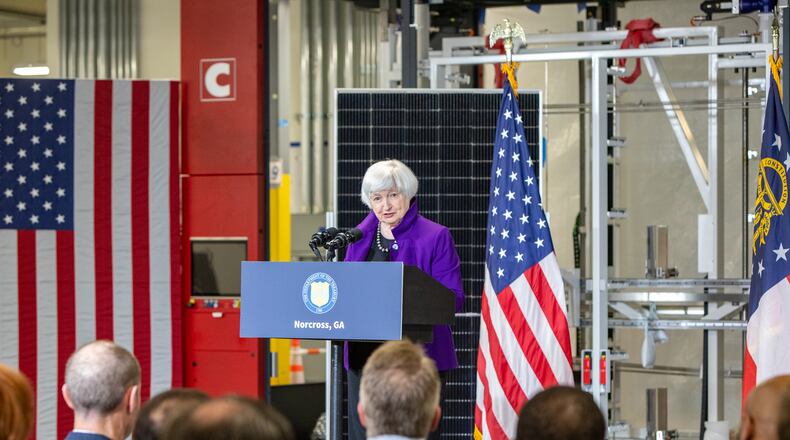U.S. Treasury Secretary Janet Yellen visited a Norcross solar cell manufacturing plant Wednesday to highlight the Biden administration’s support of clean energy and to raise criticism about Chinese manufacturers she said are overproducing in various green industries.
Yellen visited Suniva’s plant, touting it as an example of domestic manufacturing. The plant shuttered in 2017 is slated to reopen this spring, bringing back hundreds of jobs and increasing consumer access to energy options.
President Joe Biden’s economic agenda is “lowering energy costs for American consumers, powering growth in strategic industries, bolstering our country’s economic security and creating opportunity,” Yellen said in a speech to a crowd of Suniva employees and local business leaders.
Yellen toured the facility, observing miles of pipes and tubing running along the plant’s ceiling and the high-tech machinery that turns panes of glass into solar cells.
The plant will be the largest manufacturer of solar cells — the building blocks of solar modules and panels — in the Western Hemisphere, according to Matt Card, Suniva’s chief operating officer. It will reopen with about 250 employees and further jobs anticipated.
Card said tax incentives created by the Biden administration and the Inflation Reduction Act will help “reestablish the United States as a leader in the field (of solar technology), provide for our nation’s energy security and lead the transition to a cleaner economy.” The incentives, he said, will promote use of solar cells produced domestically.
Credit: Jenni Girtman for the AJC
Credit: Jenni Girtman for the AJC
Yellen said Chinese manufacturers are overproducing in various green industries, destabilizing supply chains around the world. The Norcross Suniva plant’s closure in 2017 and similar woes for other U.S. manufacturers were driven by an abundance of cheaper imports, said Yellen, who said she plans to discuss the issue with Chinese officials on her next visit to the country.
China is the dominant player in batteries for electric vehicles and has a rapidly expanding auto industry that could challenge the world’s established carmakers as it goes global. The International Energy Agency, a Paris-based intergovernmental group, notes that in 2023 China accounted for around 60% of global electric car sales. China on Tuesday filed a World Trade Organization complaint against the U.S. over what it says are discriminatory requirements for electric vehicle subsidies. The Chinese Commerce Ministry didn’t say what prompted the move.
The reopening of Suniva’s plant is hoped to mark a shift from reliance on imports. The company announced Wednesday a partnership to provide cells to Minnesota-based solar panel manufacturer Heliene. Currently, all U.S. production of solar panels like the ones produced by Heliene use imported cells. Card credited efforts by Yellen and the federal government with helping facilitate the partnership.
Yellen noted increased access and affordability of solar energy leads to a long-term effect lowering monthly living costs. She also highlighted the administration’s proposal to offer a $10,000 subsidy for first-time homebuyers and efforts to reinstate the child tax credit as initiatives that would help families with their costs.
During her visit to the Suniva plant, Yellen was asked about the collapse of the Francis Scott Key Bridge in Baltimore, specifically about whether the U.S. has port capacity elsewhere to avoid an increase in prices, particularly with the prices of cars and trucks. Baltimore is a key U.S. port for import and export of vehicles.
”This is clearly a very important American port, and the president has indicated we will take every step possible to deal with supply chain disruptions and reopen the port,” Yellen said. “I know that our supply chain group is having a meeting today to assess what we know and what we think the likely implications will be. I don’t have any detail on that for you, but that is something we’re tracking very closely.”
Information from The Associated Press was used in this article.
About the Author
Keep Reading
The Latest
Featured




